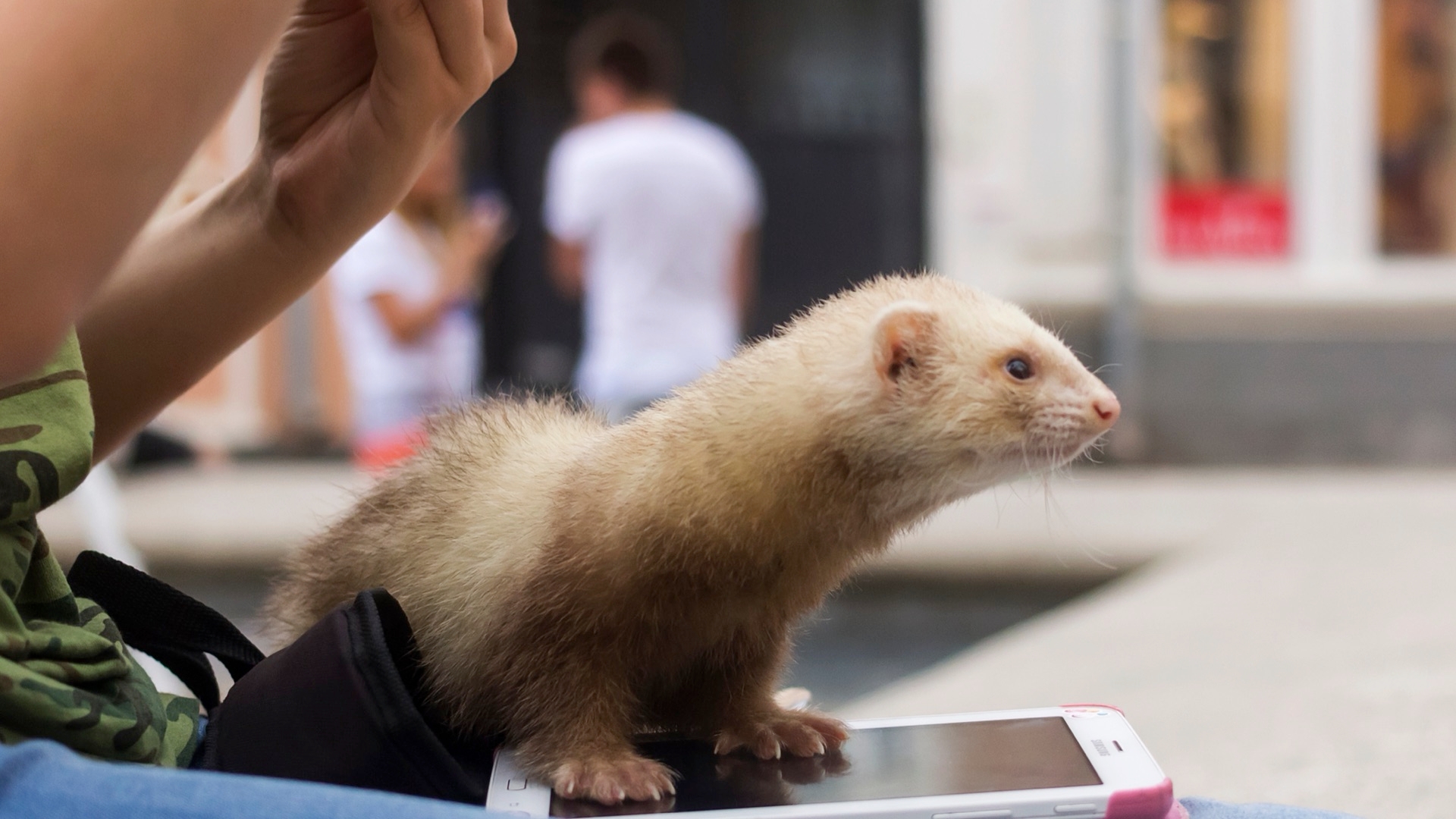Common Ferret Diseases:
Are You Considering A Ferret?
Summary:
Ferrets have become common household pets in the United States, however ferret owners should be aware that although ferrets can make good pets, they can sometimes carry germs. Although rare, germs from ferrets can cause a variety of illnesses in people, ranging from minor skin infections to serious illnesses.
Here are seven (7) common diseases that your ferret may have.
Campylobacteriosis (Campylobacter spp.)
Campylobacter are bacteria that can make people and animals sick with a disease called campylobacteriosis.
How it spreads: Campylobacter most often spreads to animals and people through the feces (poop) of infected animals, contaminated food or water, or the environment. People can become infected if they don't wash their hands after touching a ferret or its poop, food, toys, or habitat.
Who is at risk: Anyone can get a Campylobacter infection, but children younger than 5 years old, adults 65 and older, and people with weakened immune systems are more at risk for serious illness.
Signs in ferrets: Ferrets that are young or have weak immune systems may be more likely to get a Campylobacter infection. Ferrets may show no signs, or they may have diarrhea (that may be bloody), lack of appetite, vomiting, or fever.
Symptoms in people: People with Campylobacter infection can have diarrhea (often bloody), fever, and abdominal cramps. The diarrhea may be accompanied by nausea and vomiting. Symptoms usually start within 2–5 days after infection and last about 1 week.
Cheyletiellosis (Cheyletiella spp.)
Cheyletiellosis is a mild skin infection caused by parasitic mites feeding on skin cells.
How it spreads: Cheyletiellosis is spread through contact with animals that have the mites (for example, ferrets, rabbits, cats, and other animals).
Who is at risk: Anyone can get cheyletiellosis, but it's rare.
Signs in ferrets: These mites typically don't cause disease in ferrets, but if affected ferrets may have hair loss, dandruff, or itching because of skin irritation from the mites. Adult mites may be easily seen on an affected ferret. They are often white and may look like "walking dandruff" if observed moving.
Symptoms in people: These mites typically don't cause disease in people, but symptoms can include itching, redness, and raised bumps on parts of the skin that touched the animal. The inflammation caused by the mites is usually mild, short-term, and goes away on its own.
Giardiasis (Giardia duodenalis)
Giardia is a parasite that can be found on surfaces or in water, food, or soil that has been contaminated by the poop of an infected person or animal.
How it spreads: Giardia spreads through swallowing microscopic poop containing the parasite after contact with an infected person or animal, or by drinking water or eating food that has been contaminated with poop from infected people or animals.
Who is at risk: The risk of getting Giardia from ferrets is unknown. Anyone can get Giardia, but the following groups have a higher risk:
- International travelers
- People who have contact with children in diapers
- People who have contact with poop during sexual contact with someone who is infected with Giardia
- People who drink untreated water from a river, lake, stream, or spring
- People who swim in natural bodies of water.
Signs in ferrets: Some ferrets with Giardia may not seem sick, so it's important to wash your hands after playing with ferrets and to take your ferret to the vet regularly.
Symptoms in people: People with Giardia may experience diarrhea, gas, abdominal discomfort, nausea, and vomiting. However, it is possible to be infected and have no signs of illness.
Influenza
Influenza, or "flu", is a contagious respiratory illness caused by influenza viruses that infect the nose, throat, and sometimes the lungs. Flu viruses that commonly spread among people (human seasonal flu) can also affect ferrets. Other (non-human) flu viruses are found in different animal species, such as chickens and pigs, but these flu viruses are not known to circulate among ferrets.
How it spreads: Flu spreads through droplets when coughing, sneezing, or talking. You can also get flu by touching a surface or object with the flu virus on it and then touching your mouth, nose, or possibly eyes. People can spread the flu to ferrets through droplets made when coughing, sneezing, or talking, or through direct contact (touching). Animals and people infected with flu viruses may be able to spread flu to others before they develop symptoms. There are no reports of flu spreading from ferrets to people, but because ferrets can get sick with human flu viruses, it may be possible for them to spread flu viruses to people.
Who is at risk: Anyone can get sick with flu, but children younger than 5 years old, pregnant women, adults 65 and older, and people with certain chronic conditions or weakened immune systems are at high risk of developing serious flu complications. Getting a seasonal flu vaccine every year can help prevent flu and reduce the risk of serious flu complications.
Signs in ferrets: Ferrets are very susceptible to human flu. Ferrets with flu can have a variety of symptoms, including fever, thick clear or dried discharge from their nostrils, sneezing, coughing, decreased appetite, and weakness. There is no flu vaccine for ferrets. A veterinarian can help develop a treatment plan if your ferret gets the flu.
Symptoms in people: People with flu can have fever, cough, sore throat, runny or stuffy nose, muscle or body aches, headache, or tiredness (fatigue). Because flu can spread from people to ferrets, people who may be sick with flu should not be around ferrets. If contact with your pet while you are sick is unavoidable, use a face mask and gloves to prevent the spread of flu. Also, wash your hands before and after interacting with your ferret.
Rabies
Rabies is a deadly neurologic disease caused by a virus that spreads primarily through bites of infected animals. Ferret owners should get ferrets vaccinated against rabies.
How it spreads: Rabies spreads through contact with saliva or brain/nervous system tissue from an infected animal, usually through scratches or bites.
Who is at risk: Rabies in people and domestic animals is rare in the United States because of successful animal control and vaccination programs, but the disease is still found in wild animals such as bats, foxes, raccoons, and skunks. You or your pet could be at risk for rabies if you come into contact with an infected animal.
Signs in ferrets: Ferrets with rabies often have a sudden change in their behavior followed by progressive paralysis. Animals with rabies typically die within a few days after symptoms start.
Symptoms in people: Symptoms of rabies in people can appear days to months after exposure. Once symptoms appear, it is almost always too late for treatment, so if you have been bitten by a ferret or another animal, you should wash the wound immediately and see a doctor right away.
Ringworm
Ringworm is an infection caused by fungus that can infect the skin, hair, or nails of people and animals.
How it spreads: Ringworm spreads through direct contact with an infected animal or person (touching), or from the environment.
Who is at risk: Anyone can get ringworm.
Signs in ferrets: Kits (baby ferrets) and young ferrets are most commonly affected by ringworm and can have circular areas of hair loss anywhere on their bodies.
Symptoms in people: Ringworm can affect skin on almost any part of the body as well as fingernails and toenails. The symptoms of ringworm often depend on which part of the body is infected, but they generally include itchy skin, ring-shaped rash, red, scaly, cracked skin, and hair loss.
Salmonellosis (Salmonella spp.)
Salmonella are bacteria that can make people and animals sick with a disease called salmonellosis.
How it spreads: People can become infected with Salmonella by eating contaminated food, or through contact with animal poop or an animal's food. Salmonella infection in ferrets is usually associated with feeding them raw or undercooked meat or unpasteurized milk.
Who is at risk: Anyone can get a Salmonella infection, but children younger than 5 years old, adults 65 and older, and people with weakened immune systems are more at risk for serious illness.
Signs in ferrets: Salmonella infections are not common in ferrets. However, ferrets that do have an infection can have diarrhea (that can be bloody), conjunctivitis (red eyes), and anemia (low red blood cell count).
Symptoms in people: People with a Salmonella infection may experience diarrhea, fever, and abdominal cramps. Symptoms usually start 6 hours–4 days after infection and last 4–7 days.


